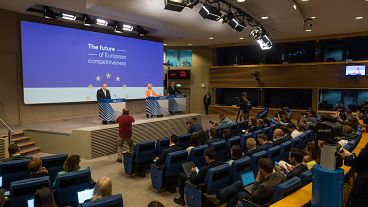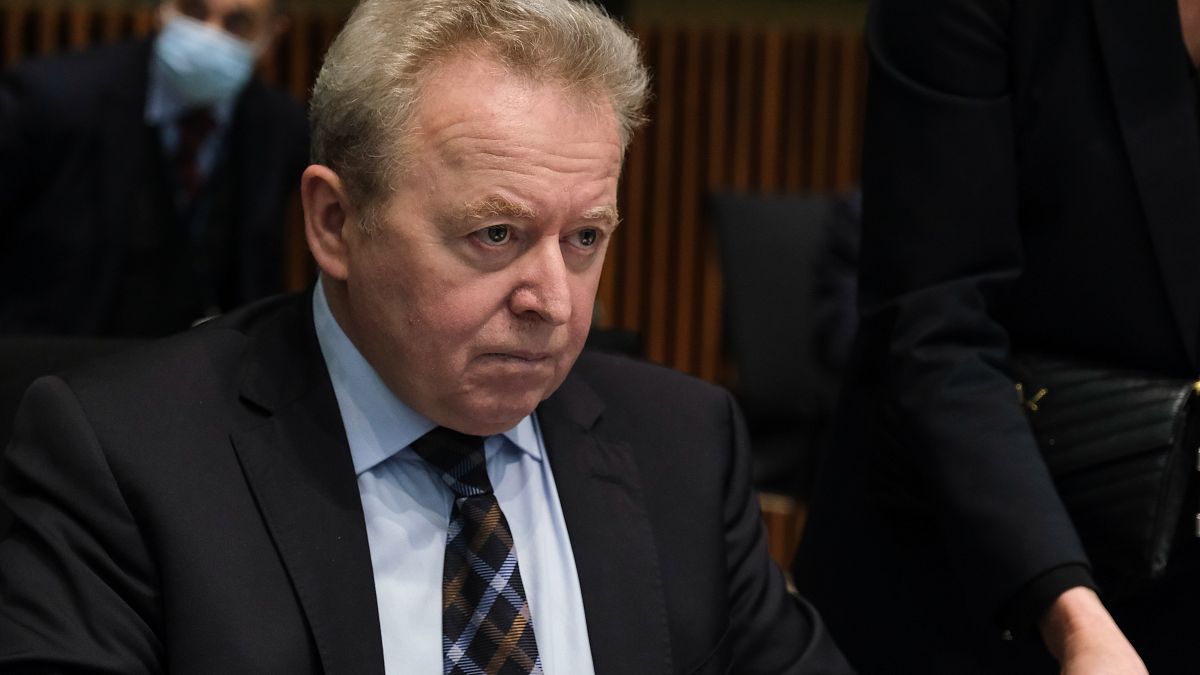There are still many unknowns surrounding President Ursula von der Leyen's slate of candidates for the next European Commission, but there are already clues about who might lead the EU’s agriculture policy in her team.
The EU Commissioners’ nomination process is now at midpoint, with more than half of the EU's 27 member states having announced candidates; attention has now turned to the allocation of portfolios.
Determining these is not straightforward at this stage in the process, but particularities of the agriculture portfolio hint at a limited number of potential candidates.
While not as influential as other economic portfolios, agriculture commands a significant share of the EU’s expenditure overseeing the bloc’s farming subsidies programme. Recent farmer protests affecting the European election campaigns underscored the sector's growing importance, particularly among right-wing factions.
Traditionally, the agriculture portfolio never goes to one of the 'Big Four'—France, Germany, Italy, and Spain—which collectively account for more than half of the EU's agricultural output.
The past three decades have seen the job entrusted instead to smaller countries like Austria, Denmark, Ireland, Latvia, Luxembourg, Poland, and Romania.
First things first: It’ll go to the EPP
Apart from the unspoken rule above, another attribute narrows the list down: the Agriculture Commissioner will be selected from among those candidates of the centre-right European People’s Party (EPP).
Von der Leyen’s party bet heavily on agriculture ahead of the EU elections, claiming to be the farmers’ party during the campaign and promising to make it a major topic in the next mandate.
However, despite managing to obtain the chairmanship of the influential European Parliament’s agriculture committee (AGRI) last month, the EPP decided to relinquish the post to the conservative group (ECR) to secure more support for von der Leyen’s reappointment and keep the door ajar on future cooperation on certain issues.
This move wasn’t well-received by many within the EPP though, with those who drafted that deal confirming to Euronews that giving up on the AGRI chair “was a big problem, as some of our delegations are very focused on agriculture.”
Two MEPs and one party source said that the deal resulted in the Commission president giving a pledge that the next Agriculture Commissioner would be from the EPP.
As the major party in the European Council, the EPP will have a significant share of the Commissioners. Eleven candidates from this party have already been nominated by governments, with another three or four names expected in the coming weeks.
However, considering the expertise of the candidates and the interests of their respective countries, the race comes down to a few names, as for more than half it would be surprising to see them take the EU farming post.
Euronews' pick: The Netherlands
From von der Leyen's perspective, the Dutch Commissioner would be a great choice for the agriculture portfolio. Yes, there are other good profiles in the EPP, but Wopke Hoekstra, who comes from the EPP affiliate Christian Democrat Appeal, ticks so many boxes that he offers the best opportunity to satisfy multiple stakeholders.
Firstly, assigning this portfolio to the Dutch government wouldn’t be that easy as it means indirectly involving far-right Geert Wilders’ party, a significant player in the ruling coalition represented externally by the neutral figure of Prime Minister Dick Schoof.
Consequently, the Netherlands can't aim for top-tier positions but can still secure a relevant portfolio such as agriculture – quite significant for a country that is a major food producer and processor. And if the portfolio includes a food segment – as seems possible – it would be particularly enticing for the Netherlands, given its strengths in this area.
Giving agriculture to the Netherlands would also reward the Dutch farmers' party BBB for recently joining the EPP. Many issues in the Dutch coalition agreement, like the nitrate directive and livestock situation, are also agriculture-related.
Additionally, Hoekstra's experience as the EU’s main negotiator at COP28 in Dubai could reassure NGOs and environmentalists who are concerned about any right-wing leanings for agriculture in the upcoming mandate.
At the same time, the Netherlands' agricultural vision, which focuses on innovation, scale production, and less organic farming, differs from the traditional views of the Big Four: This could be the only reason why this decision could turn some noses in the agriculture bubble.
Safe bets: Luxembourg, Portugal or Greece
Luxembourgish Christophe Hansen was a prominent candidate for the post from June to July. Although he lacks a strong agricultural profile, he has significant expertise in trade and environment.
However, the Luxembourgish Prime Minister's decision on the nominee hasn’t come yet and apparently hinges more on the portfolio assigned than the individual chosen. This might allow von der Leyen to negotiate for a female candidate in exchange for the coveted portfolio Luxembourg desires. Moreover, Nicolas Schmit's continuation as Commissioner hasn't been ruled out either – and as a socialist, he could not get the agriculture portfolio.
Portugal is another EPP-ruled country yet to decide on its candidate. The most likely contender is Miguel Poiares Maduro, a law professor and former minister for regional development. Despite his background suggesting a fit for innovation or research, his expertise in EU law (he was Advocate General at the EU Court of Justice for six years) makes him suitable for various portfolios, including agriculture.
Apostolos Tzitzikostas, the newly nominated Greek and former president of the Committee of the Regions is another strong candidate due to his expertise in cohesion funds, which are not dissimilar from the Common Agricultural Policy (CAP) funds.
However, the Greek government is more interested in economic or defence-related portfolios, and Greek PM Kyriakos Mitsotakis is perceived as having credit with von der Leyen after hlending her key support in her re-appointment.
Second row of the grid and unlikely picks
Current Commission vice-president for demography, Dubravka Šuica seems more suited for a health or cohesion portfolio but has worked in the past mandate on rural areas. Commissioner nominee Henna Virkkunen, despite her background in transport and energy, comes from Finland, an important forestry country, making her a potential (but unlikely) surprise pick.
Romania, which previously held this portfolio, is still undecided on its candidate. Rumours have tipped MEP Siegfried Mureșan, who has a strong economic profile. Alternatively, appointing the powerful socialist politician Mihai Tudose could secure electoral support for the current government ahead of crucial elections in November but would rule out the agriculture portfolio due to his non-EPP affiliation.
Other EPP figures are less likely to be proposed for this portfolio. Swedish Jessica Roswall, with her extensive EU affairs experience, is an unlikely choice due to Sweden's relative uninterest in agriculture. Poland is also an improbable candidate as the outgoing Polish Commissioner Janusz Wojciechowski left a negative impression being criticised by many for his lack of influence over the rest of the College, and PM Donald Tusk might seek a different portfolio.
Austrian Magnus Brunner and Irish Michael McGrath, both with strong economic backgrounds, and the young Lithuanian Gabrielius Landsbergis, more prepared for foreign affairs, are also unlikely choices. Latvia’s Valdis Dombrovskis is expected to receive a larger portfolio, while Cyprus, yet to nominate its candidate, is more focused on the new Mediterranean portfolio.












